They are called the B’aka and they live in the tropical jungles of West Africa, mostly in the Congo. They shun civilization and live in harmony with their world, or as much as their Bantu and Western neighbors allow. What is most striking to the few outsiders allowed to visit them is not so much their diminutive size, but a total sense of contentment and almost complete harmony in the village. I have seldom heard any raised voices or crying, especially among the infants who are carried by their mothers on their hips or backs, providing a secure and nurtured cradle. And all this without TV or even electricity!
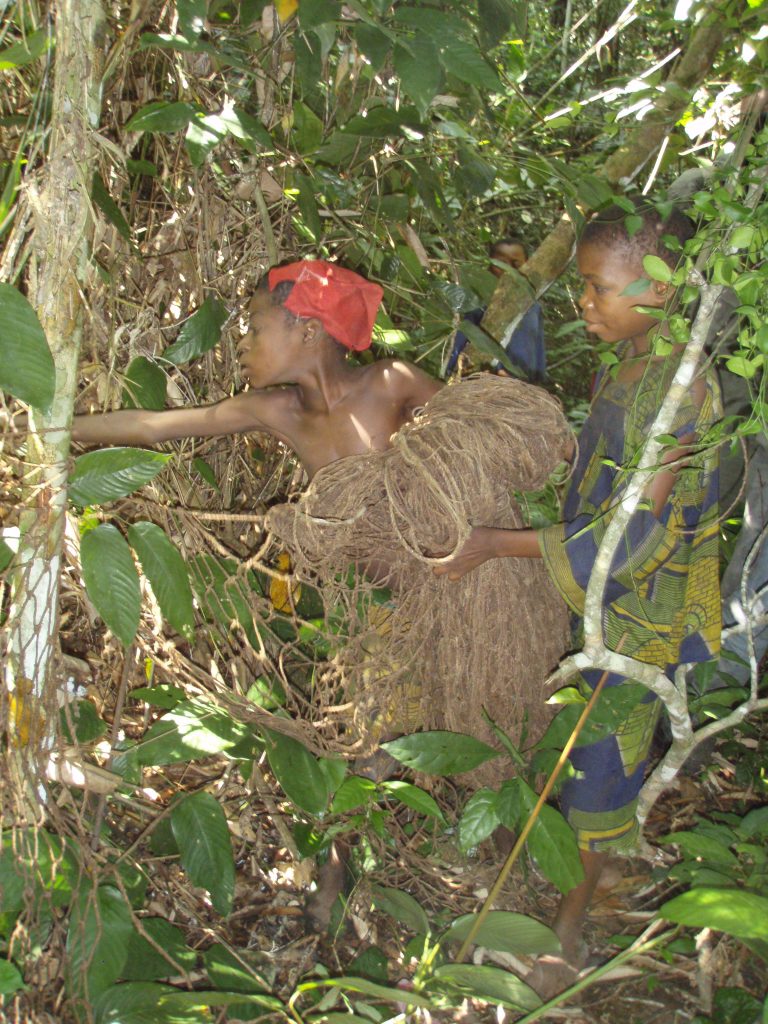
The group I have been privileged to become acquainted with live a very long way away from any other humans, for the basic reason that they do not want to be associated with any other humans. They have always been exploited, and so have fled to remote locations, far from civilization. On one memorable voyage with an extremely elderly B’Aka he recounted how, when the Bantu first came into the jungle, they hunted and ate the B’Aka! I think I would keep my distance if faced with such a situation as well! Far in the shadows of the giant trees they continue to live as they always have; in a contented manner that is as far removed from high rises and street signs.
Just to get to their village is a challenge. You have to navigate a tortuous winding river in a dug-out canoe. The paddlers have to push as well as paddle the monster log along narrow winding passages where the canoe slips like a duiker down the gullet of a python. You often scrape the bottom and all passengers have to disembark to push the canoe over the sunken logs and sand bars. When the canoe can no longer be muscled forward everyone gets out and the mud slog begins.
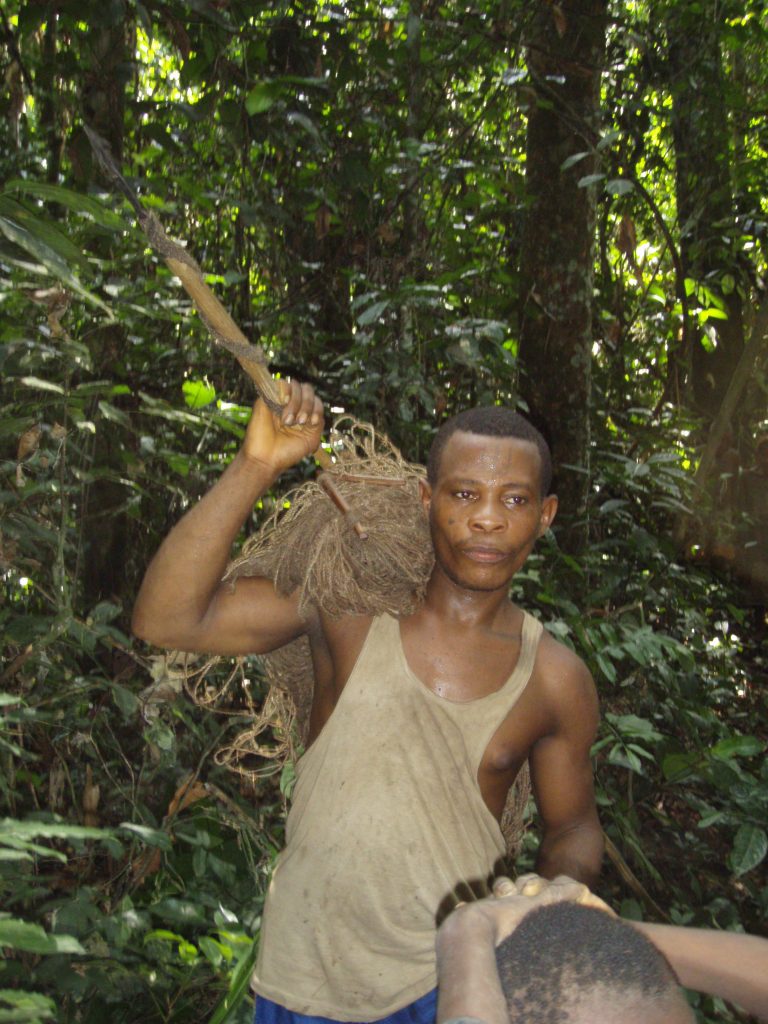
As my friend noted, it is obvious the B’Aka do not want any visitors and keep the trail as nasty as possible. Unless you possess a supreme sense of balance, which translates to balancing on mud-encrusted small logs and branches, you will most assuredly end up hip-deep in the mud below. A mounting sense of frustration accompanies any outsider as you watch the B’Aka scamper along as if this was a groomed trail heading home, which, I guess it is. To the Western mind, it more resembles a marine obstacle course with a cauldron of mud below to accept the failures.
After about two hours of exhausting balancing and extracting yourself from the quagmire you emerge into a set of disorganized gardens. The mere fact that this village has gardens is a bow to the modernization of the B’Aka. Older traditional villages had no permanent roots, as they moved at will through the vast jungle, but modern times have constricted the B’Aka lifestyle, and they can no longer barter for everything they need with meat and honey harvested from the forest. At the same time, this group has decided they will continue to live as far away as possible, so as to prevent the Bantu from solidifying their hold on the diminutive people. This has led to the concession of having to cultivate some crops.
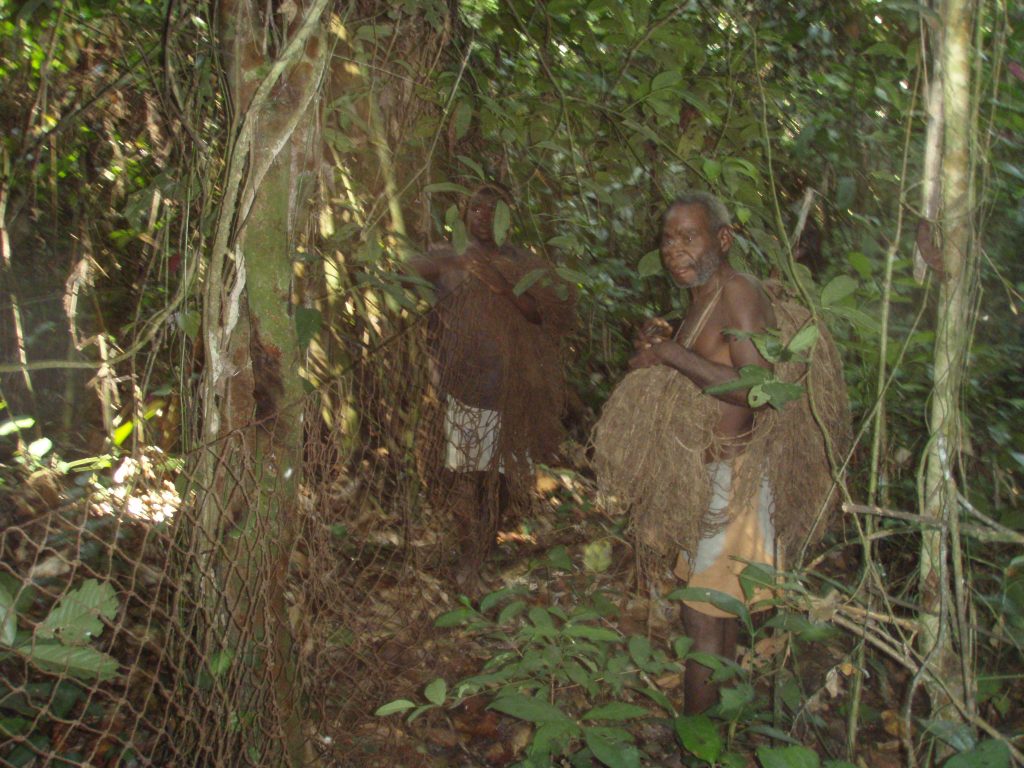
I first visited this particular village in 2002 and was treated to a very magical experience, but at the same time, a very reserved one. I was looking for twelve porters to carry the gear for me and my two companions into the forest for an extended exploration. One of my companions was actually my son, and his thirteen-year-old figure helped to assure the B’Aka that I had no ulterior motives. It took two days of negotiations to come up with the required porters and even then I ended up accepting one lad of twelve. I was hesitant to accept this lad who was even smaller than my son and proposed to carry a 40-pound load for days on end. I found myself with no choice and took him; he ended up doing a magnificent job. I had thought my son was tough until I had the definition of tough before my very eyes.
It was only after one of the elders came and spoke to me, through an interpreter, that I was able to make any more headway. This stately old gentleman knew a missionary friend of mine and volunteered to come with me. Once he made it clear he would be coming along I was able to convince my future porter train to sign up. In retrospect, they had a legitimate fear that I would only use their services and not reward them, which was the norm for the relations they had with most outsiders. They had almost no history of dealing with true foreigners, as I was only the second white person to make it to their village in living memory. My missionary friend was the other.
What is important to remember in dealing with the B’Aka is they have no chief. Every individual is free to do as he wishes, and although the elders are respected, they have no actual authority in the village. Consensus is the norm, but not the rule. This is true of the hunting as well. Each person does as he feels best, which can lead to a sense of total frustration for an outsider used to some sort of program being followed.
This elder B’Aka proved immensely valuable as we ventured further and further into the jungle. Even though I had traveled extensively with the Aka of Cameroun, and in fact even spoke a common language with them, the B’Aka are different.
One altercation took place when the oldest hunter took my gun and went off hunting. This nearly canceled the exploration. I was not pleased that he had taken my gun and shells and told him it was “like stealing” since he had not asked permission, and in fact, had told me a lie as to where he was going. It was only the intervention of the elder that kept the party together. By the end of the trip, the older hunter and I were fast friends and he was the first to greet me on my return nine years later with a big handshake and ear-to-ear grin, but I was nearly abandoned in the bottomless sea of green with all my gear.
Because of how this hunter was ultimately treated, along with the rest of the porters, my return in 2011 was more like a homecoming. I had my choice of over 40 porters and even had one porter follow us for two days to catch up with us and claim a load, just as he had nine years before. I was very pleased by this, as it showed me a loyalty I had only hoped for.
I was continually reminded that what an intrepid explorer needs to do is constantly remember the vast gulf of cultural tradition that separates a Western hunter and a B’Aka hunter. Although we have many of the same common goals in mind the B’Aka is used to tracking his game so an early start is not critical. Tracks will be there just as much after the dew dissipates, and it is much more comfortable to track while dry. B’Aka hunters like to be back in camp by dark, or even well before, so they can sort out sleeping arrangements. After all, he has no flashlight and the resin torches he makes are too valuable to use every night. Once a large animal is shot there is no need to do anything but feast and sleep. The concept of continuing hunting is ridiculous, as anyone can see you cannot carry any more meat anyway. In fact, the whole idea of keeping the horns and skin, which are not edible, is so crazy he has a very hard time conceiving of what it is we do with them. It is attributed to some sort of very powerful magic.
In any case, I was fortunate enough to return to Congo a long nine years after my last trip with the B’Aka. I was disappointed to discover that three of the thirteen porters and guides I had previously employed were dead, but the rest were thrilled to welcome me back.
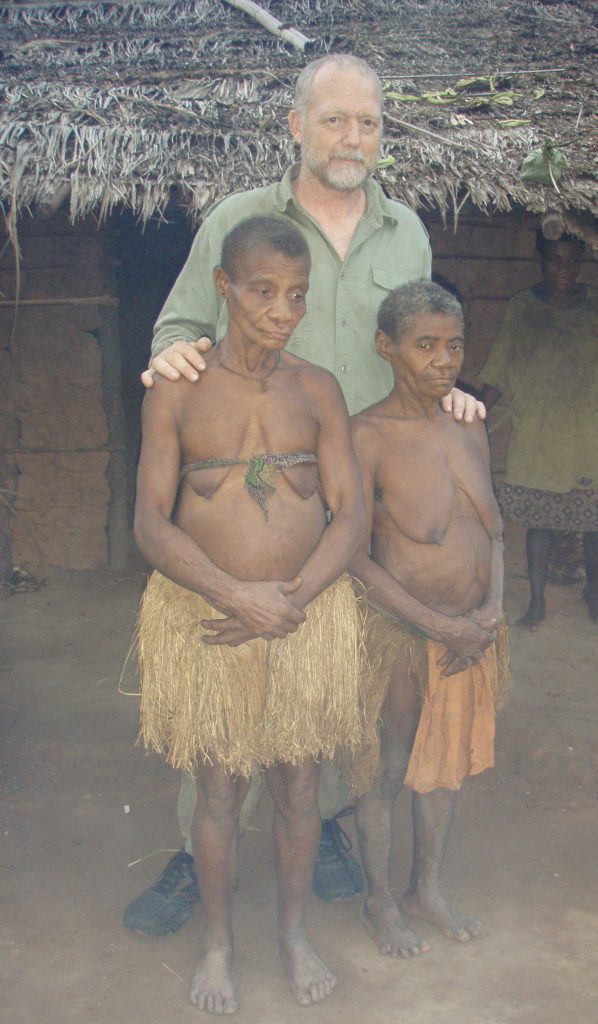
Despite the remoteness of the village, it had changed much more than I had anticipated. While previously I had bought good working crossbows with the poison still dripping from the arrows, on my return I was hard-pressed to find even a broken down one for sale. I could not find any of the B’Aka who still used them to hunt monkeys. The honey pots fabricated from bark were no longer readily available and it seemed many of the traditions were disappearing. None of the younger B’Aka drilled a hole in their upper lip to provide a feeding hole for possible tetanus, and many fewer scarred their faces or sharpened their teeth to points. The forest spirit dance I requested brought a lot of consternation, and when it finally took place it was obvious that they had gone out and fabricated the costume of the spirit just for us. Even in the B’Aka world things are in rapid flux.
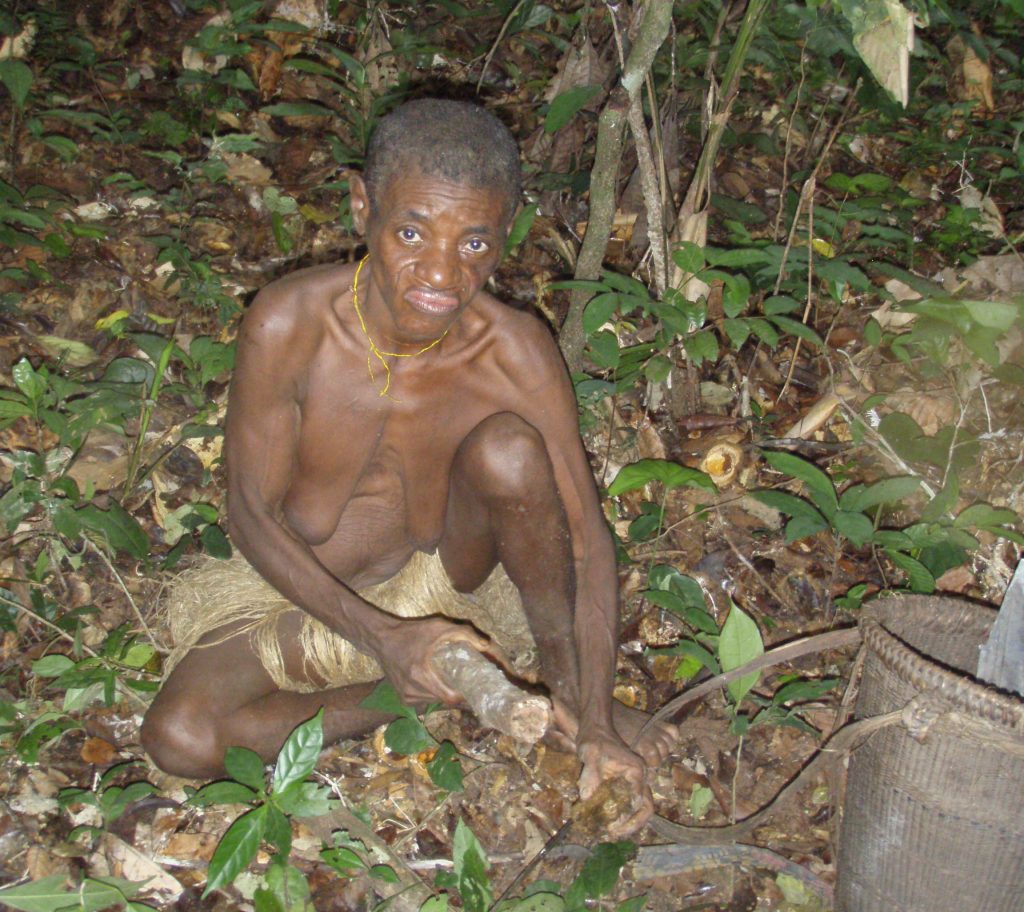
The one thing I wished to experience before I left my forest friends was a true net hunt. This was the traditional manner in which the B’Aka meat of the jungle was harvested. Each adult male in the village owns a hunting net. These are fabricated from the vines of the forest and traditionally given to a young man on his entry into manhood by his mother. His wives and other females that he is responsible for would add additional nets on into his manhood. I have hunted with men who are traditionally bound to provide for up to 10 women, as men have a hard life in the jungle and young men tend to want to go away to the bigger towns to seek their fortune. This often leaves a surplus of women in the village, who all need care.
I had sent ahead a runner to the village to let them know that I would be coming and that I wished for us to participate in a net hunt together. When I reached the village I informed them that I really wanted to do a net hunt, but they said it would be best done at the end of the trip. On the return from the deep forest, I repeated my request once again and was told that it would take place and everyone from the village would participate. Well, after so many requests, it looked like I would at long last get to have my net hunt.
As I fell to sleep in my hammock in the center of the village the town crier could be heard making the rounds of all the small beehive-sized homes scattered along the trail. He was admonishing all the men to be ready at dawn the next day and all the women and children were reminded to be quiet, as this was not a game but serious business. Just like in medieval times, this was the way village news was distributed. He seemed to revel in his assignment and had a pleasant, but loud voice, which he utilized to full effect while he circled the village, at least two times before I finally drifted off to sleep.
I was told we would all be leaving at 8:00, so was up bright and early with the sun. I traded some chocolate candies for some fresh papayas and we donned head nets to stave off the sweat bees and waited. The hut nearest us finally came to life around the appointed 8:00 time frame, but his only order of business was to set his net out and start repairs. From the number of tears I saw in it, we were in for a long wait.
Finally, around noon we headed off with about 20 B’Aka, mostly the same young men who had just finished our trip with us. I was disappointed, as I could only count 7-8 nets and was quite sure this would not be adequate to entrap the duikers, but off we headed. I had to remind myself that the B’Aka have no hierarchical structure and if anyone else wanted to join they would, but I could do nothing about it that would not backfire.
I had been told we would walk for 4-5 hours before starting the hunt, but less than ten minutes from camp they made the first set. Each man set his net in such a manner that it was held up by small wooden hooks and the natural vegetation. The nets overlapped side-to-side and were about three feet tall. On closer inspection, it was obvious the nets were not securely set at all, but engineered to collapse on the duiker or animal running into them.
Suddenly we heard a lot of commotion and the excited younger boys were all running around like hounds after a fox. The basic rule of the hunt is if your net is the one the animal ends up in you get the major portion of the meat, with pre-arranged division of the rest to the village and your extended family. The beaters try to drive the bolting animals into their portion of the nets while still placing a captured animal higher in value than one that gets away.
I was not surprised when the first set did not even turn up so much as a porcupine, much less a duiker, as we were within hollering distance of the village. I had a hard time believing they had actually scared up a duiker that had escaped. What did surprise me was that almost all the subsequent sets caught animals. By the end of the day, four blue duikers had been caught, and a few missed, including a yellow back duiker, the largest of all duikers. In the end, over 20 nets were in use and about 60 villagers participated. It was a genuine circus and I could see it served as a bonding experience for the whole village.
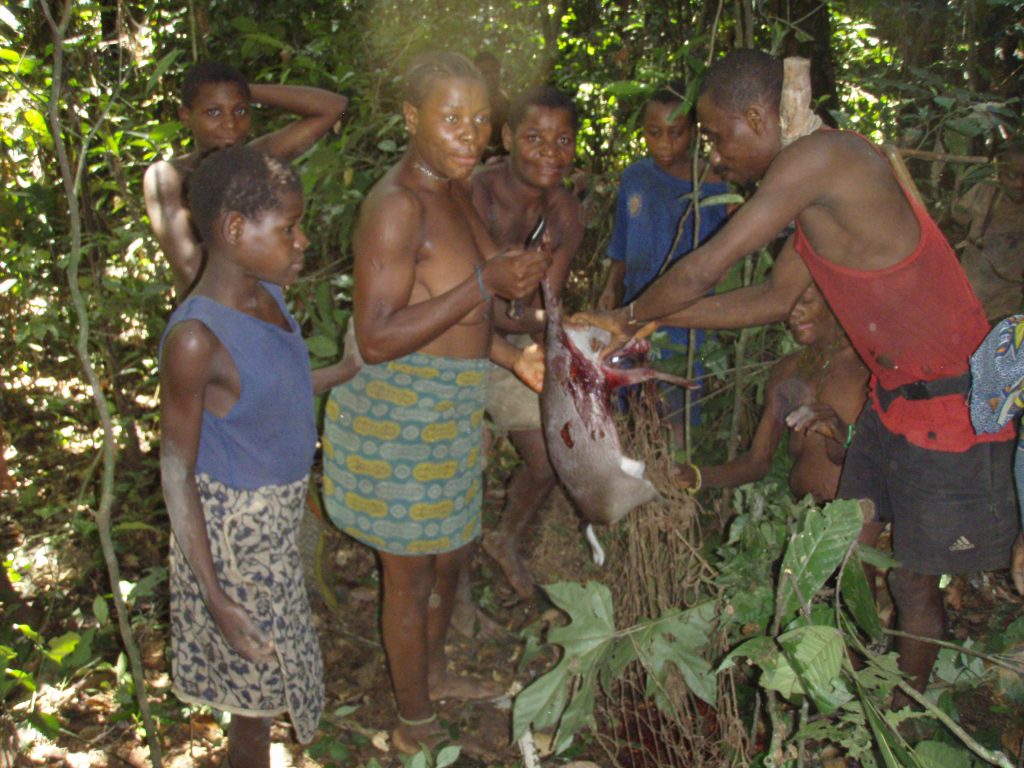
The young men were the most excited, running back and forth as the game was herded into the nets. The young girls brought along baskets slung from a trump line around their foreheads and gathered fruits and nuts as we went along. The older women seemed to have their eye on particular plants and leaves, which they would stop to gather as we moved from set to set.
At one point we came upon a tree that had dropped its nuts and the whole village stopped to gather, crack, and eat. It served as a rest stop, and when most of the nuts were gone everyone picked up their nets, and off we went. An anthropologist would have enjoyed the experience almost as much as I did. Here were a stone-age people exhibiting true hunter-gathering as a means of livelihood, well into the 21st century.
In spite of what I thought was a very low catch of meat for 60+ people, they insisted that we take the back half of the first blue duiker that was caught. At no time in the hunt were there any serious arguments, but plenty of frolicking by all.
In my observations of the B’Aka and the village life away from the Bantus, they are the happiest people I have ever had the pleasure to spend an extended time with. None of them have been to school, and few can even understand rudimentary French, but as a society, they are content and show it.
In contrast, back in the Bantu village, every gathering was fraught with the kids hitting and fighting, especially if I was handing out any sort of treat like a fishhook or candy. In the B’Aka village, I never observed this. Several times a woman would try to cut back into line when I was distributing communal gifts, but always left with a smile when she was caught out.
I am afraid that what I have managed to experience and document is fast disappearing. How the B’Aka will adapt, or even if they will, is a huge question, but I feel truly privileged to have enjoyed their company and hope to repeat it before it simply becomes history.
